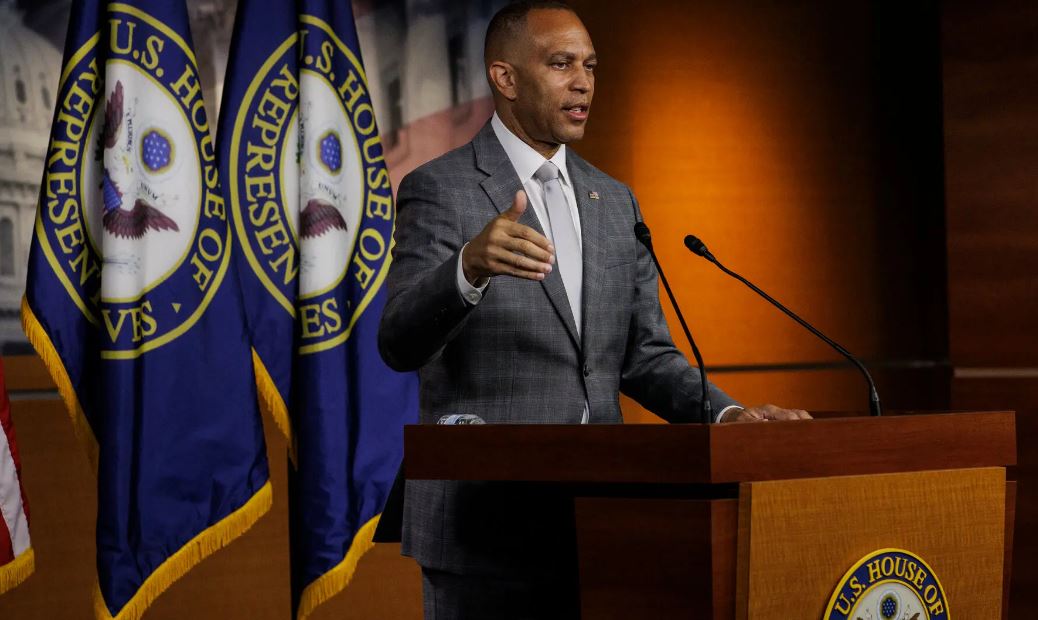Representative Hakeem Jeffries, the Democratic minority leader from New York, has organized a virtual meeting with senior House Democrats to deliberate on President Biden’s candidacy and the party’s strategy moving forward. This session, set for Sunday, will include ranking members of congressional committees, constituting the party’s top leadership in the House. The meeting comes amid significant unease among Democrats on Capitol Hill, following President Biden’s lackluster performance at the recent presidential debate.
This will be the first formal gathering of House Democrats since the debate, during which time concerns have escalated regarding Biden’s viability as a candidate. The apprehension is not just about his re-election prospects but also about the potential repercussions for the Democratic Party’s efforts to regain control of the House and maintain their Senate majority.
Throughout the week, Jeffries has adopted a listening stance, neither pushing Democrats to unite behind Biden nor urging them to make hasty public statements as the President and his team assess the best way forward. His approach aims to balance the diverse opinions within the party while allowing Biden some space to navigate the political landscape.
Despite Jeffries’ cautious approach, divisions within the party are becoming apparent. Four House members — Representatives Lloyd Doggett of Texas, Raúl Grijalva of Arizona, Seth Moulton of Massachusetts, and Mike Quigley of Illinois — have publicly called for Biden to withdraw from the race. These calls underscore a growing faction within the party that is seriously concerned about Biden’s capacity to win the election.
Representative Quigley expressed his reluctance to reach the point of urging Biden to step down. In an interview with MSNBC, he stated, “It was a hard decision, but the alternative scenario looks very bleak with almost no hope of success. This doesn’t just impact the White House; it affects the entire Congress and our future.”
Senator Mark Warner of Virginia is also mobilizing efforts within his chamber, working to convene a meeting of Senate Democrats to discuss their concerns about Biden’s candidacy and potential courses of action. According to multiple sources with direct knowledge of these efforts, Warner’s initiative reflects the broader anxiety within the party regarding Biden’s performance and its implications.
The Democratic leadership’s urgency to address these issues underscores the high stakes of the upcoming elections. Biden’s debate performance has sparked debates not just about his candidacy but also about the party’s overall strategy and messaging. The situation has placed Democrats in a challenging position, having to reconcile loyalty to their sitting president with practical considerations about electoral success.
This internal conflict is a reminder of the complexities and pressures facing political parties during election cycles. For Democrats, the path forward involves not only assessing Biden’s candidacy but also preparing for various scenarios that could influence the party’s prospects in both the presidential race and down-ballot contests.
As the discussions unfold, the party’s strategy will likely evolve, reflecting the diverse perspectives within its ranks. The outcome of Jeffries’ meeting and Warner’s efforts in the Senate could set the tone for how Democrats navigate the political challenges ahead. The decisions made in these sessions will be crucial in shaping the party’s approach to the 2024 elections, determining whether they can unite around a single candidate or face a more fragmented and contentious primary season.
The stakes are particularly high given the current political climate, where every move is scrutinized, and public opinion can shift rapidly. The Democratic Party’s ability to present a cohesive and compelling case to voters will be pivotal in their efforts to win back the House, hold the Senate, and retain the White House. The coming weeks and months will test the party’s leadership and its capacity to address internal divisions while maintaining a strong and unified front against their political opponents.

